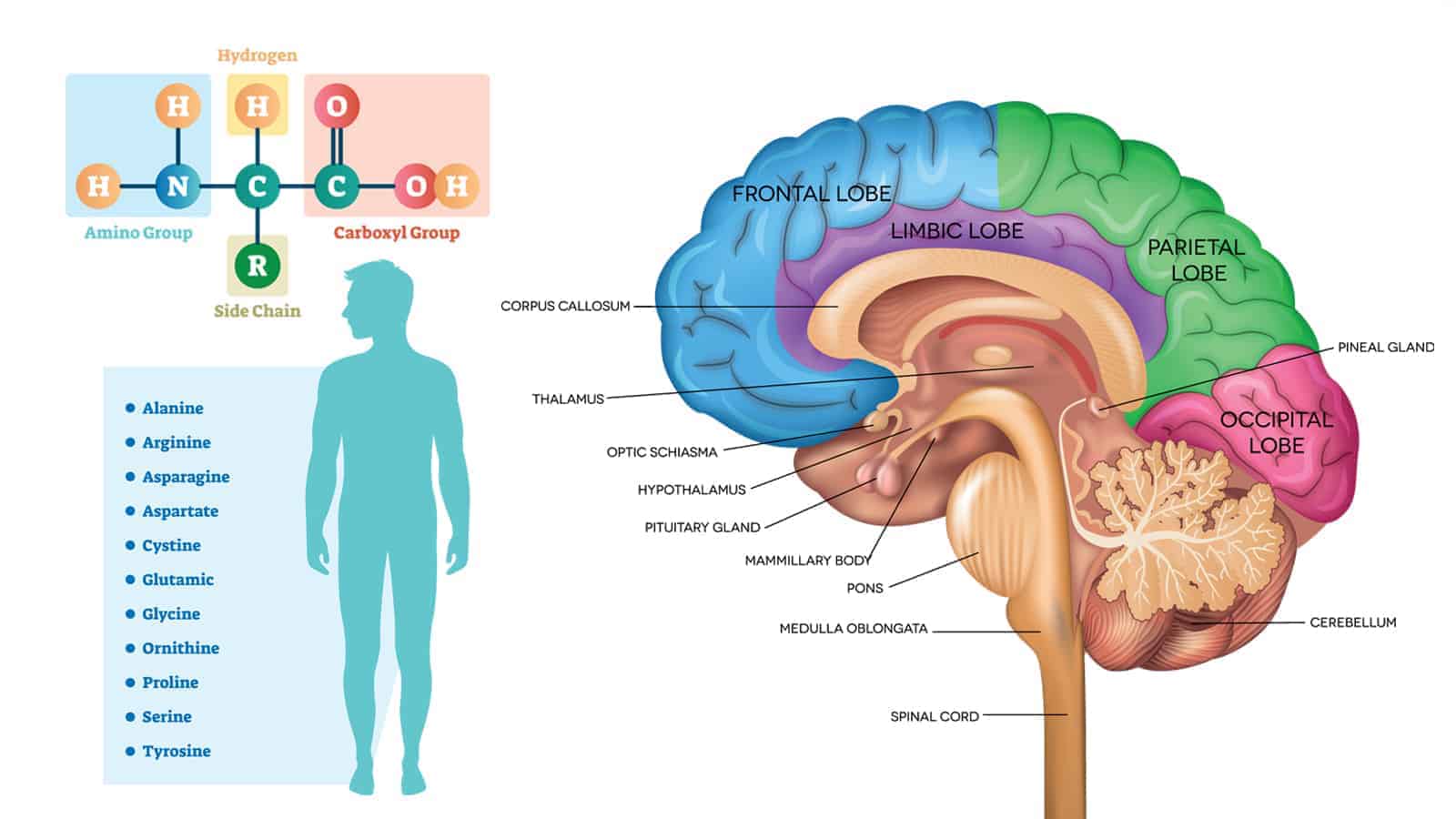A clinical trial performed by Baylor College of Medicine researchers found that certain amino acids improve cognition in older adults. In the pilot human trial, the researchers examined the effect of supplementation with GlyNAC. This is a combination of glycine and N-acetylcysteine, precursors of the natural antioxidant glutathione. They found that these amino acids could improve muscle strength and cognition and promote healthy aging in older adults.
Published in the journal Clinical and Translational Medicine, the study found that older adults saw improvements in many age-related defects. When taking GlyNAC for 24 weeks, volunteers in the study had better markers in the following areas:
- glutathione deficiency;
- oxidative stress;
- mitochondrial dysfunction;
- inflammation;
- insulin resistance;
- endothelial dysfunction;
- body fat;
- genomic toxicity;
- muscle strength;
- gait speed;
- exercise capacity and;
- cognitive function.
After the study…
However, the benefits started to wane after volunteers stopped taking the supplements for 12 weeks. During the study period, volunteers responded positively to the supplementation.
“There is limited understanding as to why these defects occur in older humans, and effective interventions to reverse these defects are currently limited or lacking,” said corresponding author endocrinologist Dr. Rajagopal Sekhar, associate professor of medicine in the Section of Endocrinology, Diabetes and Metabolism at Baylor.
For the last two decades, Sekhar and his team have studied the reasons for age-related defects in humans and mice. They have found that mitochondria, which power the cell’s biochemical reactions, along with free radicals and glutathione, particularly impact aging.
How mitochondrial dysfunction contributes to aging
Mitochondria provide energy to the cells, burning fat and sugar from foods to generate this energy. Having poor mitochondrial health directly leads to aging and the many problems associated with it. Sekhar believes that improving mitochondrial health holds the key to reversing or slowing down aging.
When the mitochondria supply energy, they produce waste byproducts called free radicals. These molecules have been known to cause cancer, as they damage cells, membranes, lipids, proteins, and DNA. Antioxidants such as glutathione, the most prevalent antioxidant in our bodies, work to eliminate these harmful free radicals. If these molecules don’t become neutralized, they can cause oxidative stress, which therefore impairs mitochondria function.
Researchers have observed that older people have consistently higher oxidative stress levels and lower glutathione levels than young people. However, animal studies performed by Sekhar’s team have found that GlyNAC supplementation can increase glutathione while lowering oxidative stress. They also observed that mitochondrial function totally improved in the aged mice taking GlyNAC.
“In previous work, we showed that supplementing HIV patients with GlyNAC improved multiple deficits associated with premature aging observed in those patients,” Sekhar said. “In this study, we wanted to understand the effects of GlyNAC supplementation on many age-associated defects in older adults.”
The study showed that GlyNAC improved cognition and other defects in aging
As the world’s population ages, age-related diseases continue to rise. Current scientific research has pinpointed nine hallmark defects that experts believe cause unhealthy aging.
“It is believed that correcting these aging hallmarks could improve or reverse many age-related disorders and help people age in a healthier way,” Sekhar said. “However, we do not fully understand why these hallmark defects happen, and there are currently no solutions to fix even a single hallmark defect in aging.”
However, Sekhar’s trial results show promise, as GlyNAC supplementation for 24 weeks improved four out of nine aging defects. To gain more insight into how GlyNAC could help mitochondria fully recover, the team conducted a pilot clinical trial.
“We worked with eight older adults 70 to 80 years of age, comparing them with gender-matched younger adults between 21 and 30 years old,” Sekhar said. “We measured glutathione in red-blood cells, mitochondrial fuel-oxidation, plasma biomarkers of oxidative stress and oxidant damage, inflammation, endothelial function, glucose and insulin, gait-speed, muscle strength, exercise capacity, cognitive tests, gene-damage, glucose-production and muscle-protein breakdown rates and body composition. Before taking GlyNAC, all these measurements were abnormal in older adults when compared with those in younger people.”
The team instructed the older adults to take GlyNAC for 24 weeks and then stop for 12 weeks. Sekhar and his team took measurements at the halfway point (12 weeks) and after the 24 week period. They repeated these measurements after participants stopped taking GlyNAC for 12 weeks as well.
“We are very excited by the results,” Sekhar said. “After taking GlyNAC for 24 weeks, all these defects in older adults improved and some reversed to the levels found in young adults.” The researchers found that the volunteers tolerated the supplement well throughout the study period. However, the benefits started to decrease after participants ceased taking the supplement.
“I am particularly encouraged by the improvements in cognition and muscle strength,” Sekhar said. “Alzheimer’s disease and mild cognitive impairment (MCI) are serious medical conditions affecting memory in older people and leading to dementia, and there are no effective solutions for these disorders. We are exploring the possibility that GlyNAC could help with these conditions by conducting two pilot randomized clinical trials to test whether GlyNAC supplementation could improve defects linked to cognitive decline in Alzheimer’s disease and in MCI and possibly improve cognitive function.”
“The overall findings of the current study are highly encouraging,” Sekhar said. “They suggest that GlyNAC supplementation could be a simple and viable method to promote and improve healthy aging in older adults. We call this the ‘Power of 3’ because we believe that it takes the combined benefits of glycine, NAC, and glutathione to reach this far-reaching and widespread improvement. We also have completed a randomized clinical trial on supplementing GlyNAC vs. placebo in older adults, and those results will be forthcoming soon.”
Final thoughts on learning how researchers determined certain amino acids improve cognition in older adults
A groundbreaking study from Baylor College of Medicine found that older adults supplementing with glycine and N-acetylcysteine had markedly improved health. These amino acids are the precursor to the natural antioxidant glutathione, the main ingredient in the GlyNAC supplement. Researchers noted that adults supplementing with GlyNAC for 24 weeks had better cognition along with many other improvements. These findings may lead to better treatments for age-related diseases in the future.















 Community
Community

